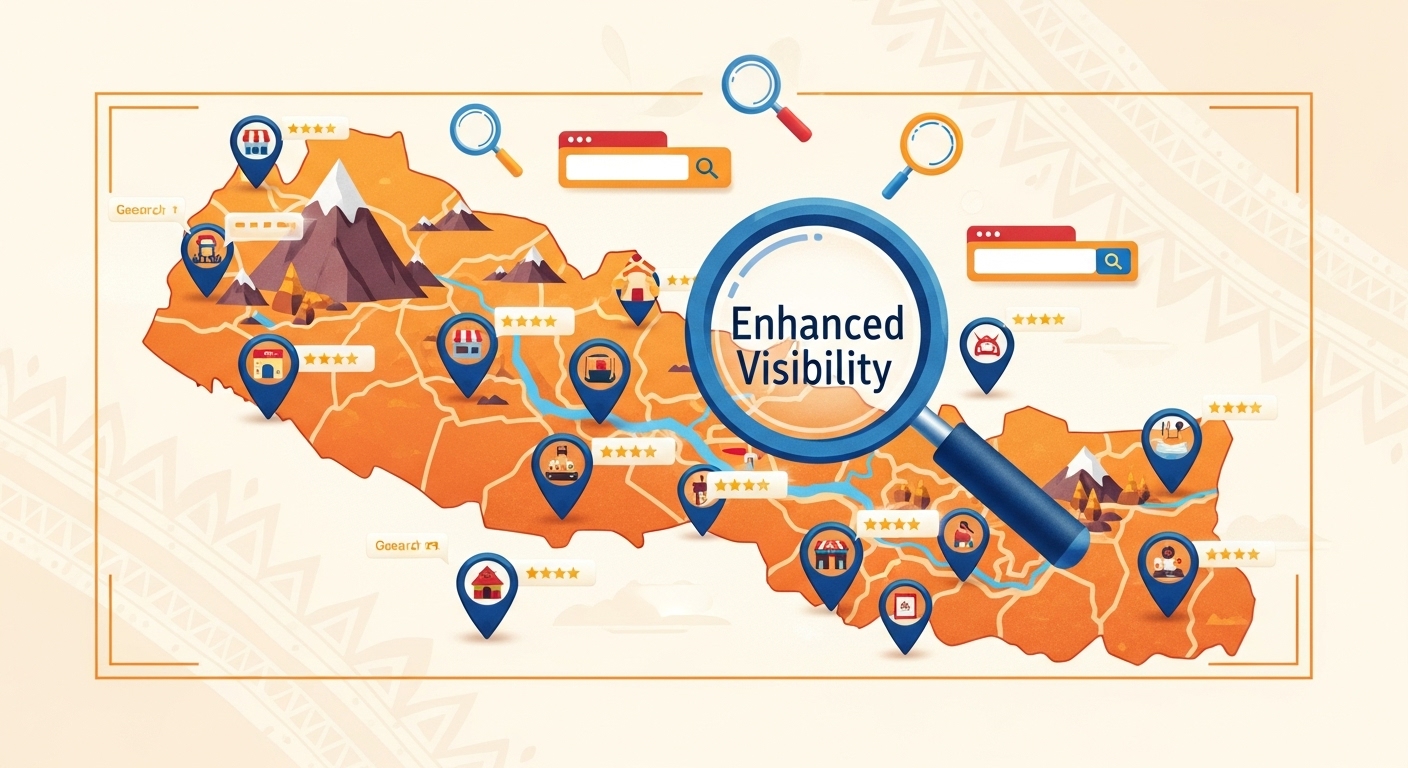Nepali Local SEO Strategies: Advanced Playbook for Businesses
Introduction: The Shifting Landscape of Local Search in Nepal
The Digital Imperative
The commercial landscape of Nepal is undergoing a profound and rapid digital transformation. With a swiftly growing internet penetration rate, the traditional methods by which consumers discover, evaluate, and engage with local businesses are being fundamentally reshaped. A significant majority of Nepali consumers—over 60% by some estimates—now utilize online search as a primary tool in their purchasing decisions. This behavioral shift establishes a new market reality: a robust and strategic online presence is no longer a competitive advantage but a fundamental prerequisite for business survival and growth. Businesses that remain invisible in digital channels risk ceding significant market share to more digitally adept competitors, as customers increasingly look for goods and services online first.
Beyond the Basics
While foundational elements of digital readiness—such as a responsive, mobile-friendly website and a claimed Google Business Profile (GBP)—remain essential starting points, they represent the bare minimum in today’s competitive environment. True market leadership requires a more sophisticated approach that moves beyond simple online visibility toward the deliberate cultivation of local trust. Trust has become the central currency in local search engine optimization (SEO). It is the critical factor that differentiates top-ranking businesses in the eyes of both search engine algorithms and potential customers. This report provides an advanced playbook for Nepali businesses, focusing on the next tier of strategies designed to build, project, and amplify this local trust.
Related: Nepal digital government programs
The “Near Me” Revolution in Nepal
The rise of mobile internet usage has fueled a global phenomenon that is now firmly entrenched in Nepal: the “near me” search. Consumers are constantly searching with local intent, using queries like “best restaurants near me,” “trekking agency in Thamel,” or “shoe store in Birgunj” to find immediate solutions to their needs. Statistics indicate that 46% of all Google searches are for local information, and a significant portion of these high-intent searches convert into offline purchases, often within 24 hours. For Nepali businesses, this represents an unprecedented opportunity to capture a motivated customer base precisely at the moment of decision. Mastering the strategies that build local trust is the key to appearing prominently in these critical search results and converting digital discovery into tangible foot traffic and revenue.
The Currency of Credibility – Mastering Online Reviews in the Nepali Market
Online reputation management is a cornerstone of modern local SEO, directly influencing both algorithmic rankings and human decision-making. For Nepali businesses, developing a comprehensive framework for generating and managing reviews is not merely a passive activity but an active strategy for building digital credibility and trust.

Identifying High-Impact Review Platforms for a Nepali Audience
- Google as the SEO Foundation: Google reviews are a direct and heavily weighted ranking factor for local search. Review signals—including the quantity, velocity, and overall rating of reviews—account for a significant portion of what determines a business’s placement in the coveted “local pack” and on Google Maps. A consistent flow of new, positive reviews on a business’s Google Business Profile is the primary driver of search visibility.
- Facebook as the Social Proof Powerhouse: With an overwhelming 87% share of the social media market in Nepal, Facebook operates as the de facto platform for social validation and community-level trust. While its reviews may not impact Google’s algorithm as directly as Google’s own, they profoundly influence consumer perception. Potential customers often use Facebook to corroborate a decision made after a Google search, looking for feedback from their peers and local community. A strong review profile on Facebook serves as powerful social proof that can be the final, decisive factor in a customer’s journey.
- Emerging Local Platforms: A new tier of Nepal-specific review platforms is emerging, offering an additional layer of localized credibility. Platforms such as NepalRatings.com provide features like verified reviews and location-based discovery, which can help a business build a more nuanced and locally-focused reputation. Other directories like Nepal.JantaReview also incorporate review functionalities, further diversifying the ecosystem where a business’s reputation is built and assessed.
The distinct roles of these platforms necessitate a dual-front reputation strategy. The consumer journey in Nepal often begins on Google but concludes with validation on Facebook. A typical sequence involves a user searching for a local service on Google and discovering a business with strong Google reviews. This establishes initial credibility. However, before committing to a visit or purchase, that same user will often search for the business on Facebook to see what their social circles and the broader local community are saying. A business that excels on Google but has a weak or non-existent presence on Facebook risks losing that customer at the final stage of consideration. Therefore, a comprehensive strategy must actively cultivate a positive reputation on both fronts: Google for algorithmic visibility and Facebook for social proof and community trust.
Strategic Review Acquisition in a Nepali Context
A frequently cited challenge for Nepali businesses is the difficulty in acquiring genuine online reviews. This suggests that passive hope is an ineffective strategy; businesses must be proactive and systematic in their approach to soliciting feedback.
Effective, trust-building acquisition tactics include:
- Integrating Requests into the Customer Journey: The ideal time to ask for a review is immediately following a positive experience. This can be automated through a follow-up message on WhatsApp after a successful delivery or in-person service.
- Leveraging Physical Touchpoints: In-store signage with QR codes that link directly to the business’s Google or Facebook review page can simplify the process for customers, increasing the likelihood of participation.
- Guiding for Quality: When requesting a review, businesses can gently encourage customers to mention the specific product or service they used and their location (e.g., “We’d love to hear about your experience with our momo platter at our Thamel branch!”). This practice enriches reviews with valuable local keywords, further boosting their SEO impact.
Reputation Management as a Public Trust-Building Exercise
How a business manages its reviews is as important as acquiring them. Every review is a public-facing interaction that signals the business’s values and commitment to customer satisfaction.
- Responding to Every Review: It is imperative to respond to all reviews, both positive and negative. Acknowledging positive feedback shows appreciation, while addressing negative feedback demonstrates accountability. Research shows that businesses that respond to reviews see higher conversion rates, as it signals to prospective customers that the business is active, engaged, and values its clientele.
The fragile trust environment in some digital markets means that a single negative review, if handled correctly, can become a powerful marketing asset. In a space where consumers are wary of fake or overly curated praise, a public and professional resolution to a customer complaint can build more profound trust than a dozen generic five-star ratings. When a business receives a negative review, instead of ignoring it, a public response that acknowledges the issue, apologizes sincerely, and offers a tangible solution transforms the interaction. A potential customer researching the business will see this exchange not as a sign of failure, but as proof of transparency, accountability, and superior customer service. This act of public problem-solving neutralizes the negative sentiment and converts the review into an authentic and compelling signal of trustworthiness.
Building a Consistent Digital Footprint with Local Citations
A citation is any online mention of a business’s core contact information. Building a robust and consistent portfolio of these citations is a foundational element of local SEO, serving as a primary way for search engines to verify a business’s existence, location, and legitimacy.
The NAP Consistency Mandate: The Cornerstone of Local Authority
At the heart of any citation strategy is the principle of NAP consistency. A business’s Name, Address, and Phone number must be identical across every single online platform where it is listed, from its own website to social media profiles and online directories. Even minor variations—such as “Pvt. Ltd.” versus “Private Limited,” or inconsistencies in street name abbreviations—can create confusion for search engine crawlers.
This confusion erodes the algorithmic trust Google places in the business’s location data, which directly harms its ability to rank in local search results. Absolute consistency is non-negotiable for building local authority.
Navigating the Nepali Directory Ecosystem
The goal of citation building is not simply to accumulate the highest number of listings, but to secure placements in high-quality, relevant directories that are trusted by search engines and used by local consumers. For Nepali businesses, this involves a strategic approach to the local directory ecosystem.
Prioritization should be based on a directory’s domain authority (a measure of its overall strength), its relevance to the business’s industry, and its local focus. Key general directories in Nepal include established players like YELLOWPAGES NEPAL (Domain Authority 32) and NepalYP (Domain Authority 44), as well as growing platforms like Reveal Nepal (Domain Authority 26), Inquiry Nepal, and Bhetincha. Many of these platforms offer valuable features, such as manually verified listings, which further enhance the trust signal they provide.
Beyond these broad directories, a comprehensive strategy should also target:
- Industry-Specific Websites: A trekking company, for example, should be listed on travel and tourism portals relevant to Nepal.
- Local Community Platforms: Listings on local classifieds sites like Gaubazar.com or mentions in local online forums can provide highly relevant, hyperlocal signals.
The following table provides a prioritized, actionable checklist for Nepali businesses to begin building a powerful citation profile.
s>
| Directory Name | URL | Domain Authority (DA) | Listing Type | Key Features & Relevance for Nepali Businesses |
|---|---|---|---|---|
| NepalYP | nepalyp.com | 44 | Free/Paid | Well-managed with category and location-based sorting. High authority in the Nepali context. |
| YELLOWPAGES NEPAL | yellowpages.com.np | 32 | Free | A well-known and established directory, excellent for foundational business visibility. |
| Reveal Nepal | revealnepal.com | 26 | Free | Growing local directory with a focus on connecting local businesses and providing trend information. |
| Inquiry Nepal | inquirynepal.com | N/A | Free/Paid | Manually verifies all listings for quality and is SEO-optimized, providing a strong trust signal. |
| BizDire Nepal | bizdirenepal.com | N/A | Free | Features a large number of categories and verified business listings, suitable for a wide range of industries. |
| Nepal Business Hub | nepalbusinesshub.com | N/A | Free | Offers extensive categorization for various service and retail businesses. |
| Bhetincha | bhetincha.com | N/A | Free | An online listing site focused on increasing visibility in local areas. |
| Nepal Atlas | nepalatlas.com | N/A | Free | Focuses on connecting buyers and sellers with a presence across all major towns in Nepal. |
Citation Management and Auditing
Building citations is not a one-time task. Businesses must periodically audit their online presence to find and correct inconsistencies. Outdated phone numbers or old addresses can linger on obscure websites for years, actively harming local SEO efforts. A simple auditing process involves using Google search operators (e.g., searching for “Your Business Name” “Old Phone Number” -site:yourwebsite.com) to uncover outdated listings. Proactive management ensures that the digital footprint remains clean, consistent, and continues to send strong, positive trust signals to search engines.
Conversational Commerce – Integrating WhatsApp Business for Local Engagement
In Nepal, WhatsApp is more than a messaging app; it is a primary mode of communication for a vast portion of the population. For local businesses, this ubiquity presents a powerful opportunity to engage in “conversational commerce”—using the platform for direct marketing, sales, and customer service. Integrating WhatsApp Business strategically can transform it from a simple utility into a core driver of customer relationships and revenue.
Setting Up for Success: The Professional WhatsApp Storefront
The first step is to establish a professional and functional presence on the platform. The free WhatsApp Business app provides tools specifically designed for this purpose.
- Optimizing the Business Profile: This is the digital storefront within WhatsApp. It is crucial to create a complete profile that includes the official business name, a compelling description, accurate business hours, a physical address, and a link to the official website. This information provides immediate context and credibility to customers who initiate a chat.
- Creating a Product/Service Catalog: The Catalog feature is one of the most powerful tools within WhatsApp Business. It allows businesses to create a mini-e-commerce experience directly within the app. Each product or service can be listed with multiple images, a name, price, detailed description, and even a direct link to a purchasing page on the main website. A restaurant can showcase its entire menu, a retail shop can display new arrivals, and a service provider can detail its various packages. Customers can browse this catalog, select specific items, and send an inquiry about them in a single tap, creating a seamless and low-friction path from discovery to purchase consideration.
Lead Generation and Sales Funnels
Once the storefront is established, businesses can use WhatsApp to proactively generate leads and guide customers through the sales process.
- Click-to-Chat and QR Codes: To encourage inbound communication, businesses should implement “Click-to-Chat” links on their websites, in social media bios, and within digital ads. These links open a pre-populated WhatsApp chat, removing the friction of a customer having to save a phone number manually. Similarly, placing QR codes on physical marketing materials—such as menus, flyers, or in-store displays—provides a seamless bridge from the offline world to an online conversation, effectively converting foot traffic into digital leads.
- Broadcast Lists for Targeted Promotions: Unlike group chats, which are public and can feel spammy, broadcast lists allow a business to send a single message to multiple contacts simultaneously, with each recipient receiving it as a private message. This tool is ideal for sending personalized promotions, announcing new product launches, or sharing special offers with customers who have opted-in to receive communications. This direct and personal approach often yields higher engagement than a generic social media post.
Enhancing Customer Experience and Building Loyalty
WhatsApp excels at fostering the kind of two-way, real-time communication that builds lasting customer relationships.
- Automation for Efficiency and Responsiveness: The WhatsApp Business app includes several automation tools to improve service quality. “Greeting messages” can be set to automatically welcome new customers, while “away messages” inform them of business hours and manage expectations. The “Quick Replies” feature is particularly useful for instantly answering frequently asked questions (e.g., “What are your hours?”, “Do you deliver?”) with pre-saved responses, ensuring customers receive prompt and accurate information without requiring constant manual intervention.
- Real-Time, Personalized Support: The core strength of the platform is its ability to facilitate direct, human-to-human conversation. Businesses can use it to answer complex customer queries, provide personalized recommendations, confirm appointments, and even process orders. This high-touch, conversational support model builds significantly more trust and loyalty than more impersonal channels like email or contact forms.
- Gathering Feedback and Fueling the Review Engine: After a successful transaction or service, businesses can use WhatsApp to send a simple, personal message asking for feedback. This can take the form of an informal poll or a direct question. This interaction not only provides valuable insights for service improvement but also serves as a perfect opportunity to then ask satisfied customers to leave a formal review on public platforms like Google or Facebook, thus creating a powerful feedback loop that fuels the broader reputation management strategy.
Amplifying Local Voice – The Role of Nepali Influencers in SEO
Influencer marketing is often viewed through the lens of social media engagement and brand awareness. However, when executed strategically, it can be a potent tool for achieving tangible local SEO outcomes, moving beyond vanity metrics to build genuine digital authority.
Identifying the Right Local Partners in the Nepali Ecosystem
The effectiveness of an influencer campaign for local SEO depends entirely on selecting the right partners. The Nepali influencer market is diverse and can be segmented into several tiers.
- Understanding the Tiers of Influence: The market includes Nano-influencers (1,000-10,000 followers), Micro-influencers (10,000-50,000 followers), and Mid-Tier influencers (50,000-500,000 followers), each with varying levels of reach, engagement, and cost. For the specific goal of local SEO, Nano and Micro-influencers are frequently the most valuable. Their audiences are often more geographically concentrated and highly engaged, making their endorsement feel more like a trusted recommendation from a peer rather than a paid advertisement.
- Discovery and Vetting: Businesses can discover potential collaborators using platforms dedicated to connecting brands and creators, such as Influencer Nepal, or by browsing freelance marketplaces like Upwork. Vetting is a critical step that goes beyond follower count.
It requires a careful analysis of an influencer’s audience demographics to ensure a strong concentration of followers within the business’s target geographic area (e.g., a high percentage of followers in the Kathmandu Valley for a business located there) and an assessment of their engagement quality to ensure their audience is real and responsive.
Crafting SEO-Driven Collaborations
A local SEO-focused influencer campaign must be designed to generate more than just a temporary spike in social media likes. The objective is to create lasting digital assets that contribute to the business’s search authority.
- Local Link Building: The most valuable outcome of an influencer collaboration is often a high-quality backlink. The campaign agreement should stipulate that the influencer will publish a blog post on their own website detailing their experience with the business. This post must include a “dofollow” link back to the business’s website. A link from a relevant, local blogger is a powerful signal to Google that the business is an authoritative entity in its local niche.
- Generating User-Generated Content (UGC) and Reviews: The influencer can be tasked with running a contest or a call-to-action that encourages their followers to visit the business, create their own content (photos, videos), and share it online using a specific hashtag and tagging the business’s profile. This strategy creates a wave of authentic social proof and user-generated content. The influencer’s own post about the business also functions as a highly visible and trusted third-party review.
- Collaborative Content Creation: Businesses can partner with local influencers, such as food bloggers or travel vloggers, to create content for the business’s own platforms. For instance, a restaurant could feature a video of a well-known local food critic reviewing their menu on the restaurant’s YouTube channel, or a trekking company could publish a guest blog post from a popular adventure traveler. This leverages the influencer’s credibility to enhance the business’s own content marketing efforts.
A single, well-executed local influencer collaboration can function as a multi-faceted SEO event, accelerating the acquisition of several different trust signals at once. Consider a local food blogger in Kathmandu collaborating with a new restaurant. When they publish a detailed blog post about their dining experience, that post simultaneously generates a high-quality backlink to the restaurant’s website, an unstructured citation (by mentioning the restaurant’s name and location), and a detailed, positive review from a trusted local source. When they share photos from their visit on Instagram, it drives immediate brand awareness and can lead to a spike in branded searches for the restaurant’s name—another positive signal to Google. This demonstrates that an influencer is not just a marketing channel; they are a catalyst for generating a concentrated burst of powerful, interconnected local trust signals.
Section 5: The Synthesis of Strategy – Constructing and Projecting Local Trust Signals
The preceding strategies—reviews, citations, WhatsApp engagement, and influencer collaborations—are not isolated tactics. They are interconnected components of a larger ecosystem designed to construct and project trust. This trust must be legible to both human customers and search engine algorithms, which increasingly use a framework known as E-E-A-T to evaluate the quality and reliability of online information.
Decoding Google’s E-E-A-T for Local Nepali Businesses
Google’s E-E-A-T framework stands for Experience, Expertise, Authoritativeness, and Trustworthiness. It is the conceptual model its algorithms use to identify and reward helpful, reliable content. For local businesses in Nepal, demonstrating E-E-A-T is the ultimate goal of their SEO efforts.
- Experience: This is about demonstrating first-hand, real-world involvement. A business can showcase this by using authentic photos of its staff, its physical location, and its products or services in action, rather than generic stock imagery. Publishing case studies of successful local projects, such as the ones detailed for Café Himalaya in Kathmandu and Adventure Treks in Thamel, provides concrete proof of experience.
- Expertise: This involves showcasing a deep knowledge of a particular field. A local business demonstrates expertise by creating helpful, specialized content. For example, a trekking company that publishes a detailed blog post on “The Best Short Treks from Kathmandu” is signaling its expertise to both users and search engines.
- Authoritativeness: This is about being recognized as a go-to source of information in a particular niche or locality. Authoritativeness is primarily built off-site, through earning backlinks and mentions from other respected local entities, such as local news websites, prominent bloggers, and authoritative business directories.
- Trustworthiness (Trust): Google has stated that Trust is the most important part of the E-E-A-T framework. It is the foundation upon which the other elements are built. Trustworthiness is signaled by a wide range of factors, including the consistency of NAP information across the web, a large volume of positive customer reviews, a secure website (HTTPS), and clear, accessible contact information.
On-Site Trust Architecture: Your Digital Storefront
A business’s own website is the central hub for establishing trust. It is the one digital property over which it has complete control. Several on-page elements are critical for building this trust architecture.
- Essential Pages: Every local business website must have a detailed “About Us” page that introduces the founders and key team members, complete with real photographs and professional bios. A comprehensive “Contact Us” page is equally vital, featuring not just a contact form but also the full, consistent NAP, business hours, and an embedded Google Map to the physical location. These pages signal transparency and legitimacy.
- Showcasing Social Proof: The website should prominently feature social proof to build confidence in potential customers. This includes displaying customer testimonials, linking to detailed case studies, and showcasing any professional certifications, industry awards, or positive media mentions the business has received.
- Technical Trust – LocalBusiness Schema Markup: One of the most critical technical SEO tasks for a local business is the implementation of LocalBusiness schema markup. This is a piece of code (structured data) added to the website’s backend that explicitly communicates key business information to search engines in their native language. By using schema, a business can tell Google its precise name, address, phone number, opening hours, and business category. Using a more specific schema subtype—such as Restaurant, TravelAgency, or HealthClub instead of the generic LocalBusiness—is even more powerful, as it provides greater contextual relevance. Correctly implemented schema can make a business eligible for “rich results” in search, such as displaying star ratings or event information directly on the search results page, which significantly increases visibility and click-through rates.
Off-Site Trust Amplification: Building a Web of Credibility
The off-site strategies discussed in this report directly feed into and amplify the E-E-A-T signals that Google is looking for.
- The online reviews generated on Google and Facebook (Section 1) are a primary input for Trustworthiness and provide public evidence of the Experience of past customers.
- The consistent local citations built across Nepali directories (Section 2) establish Authoritativeness by creating a verifiable and uniform presence across the web.
- The positive customer interactions facilitated by WhatsApp Business (Section 3) create a feedback loop that generates more positive reviews, further enhancing Trustworthiness.
- The backlinks and endorsements from local influencers (Section 4) provide powerful signals of Authoritativeness and serve as a form of social proof that builds Trust.
Conclusion: Securing Your Local Market Advantage in Nepal
The strategies outlined in this report demonstrate that achieving dominance in local search is no longer about mastering a single channel like Google Maps. Instead, it requires the orchestration of an integrated ecosystem of trust-building activities. The synergy created when positive reviews, consistent citations, direct customer engagement via messaging, and credible influencer collaborations work in concert is what separates market leaders from the competition. This holistic approach creates a defensible “moat” of local trust that is difficult for competitors to replicate.
For businesses in Nepal seeking to thrive in an increasingly digital marketplace, the path forward is clear. It begins with perfecting the on-site trust architecture of their own website, ensuring it is a transparent, credible, and technically sound foundation. From there, they must systematically build their off-site authority through the four key pillars detailed in this analysis: reputation, consistency, conversation, and collaboration. By adopting this comprehensive and multi-faceted strategy, a Nepali business can move beyond simply being found online to becoming the most trusted and authoritative local leader in its niche.
📚 For more insights, check out our SEO services guide.


